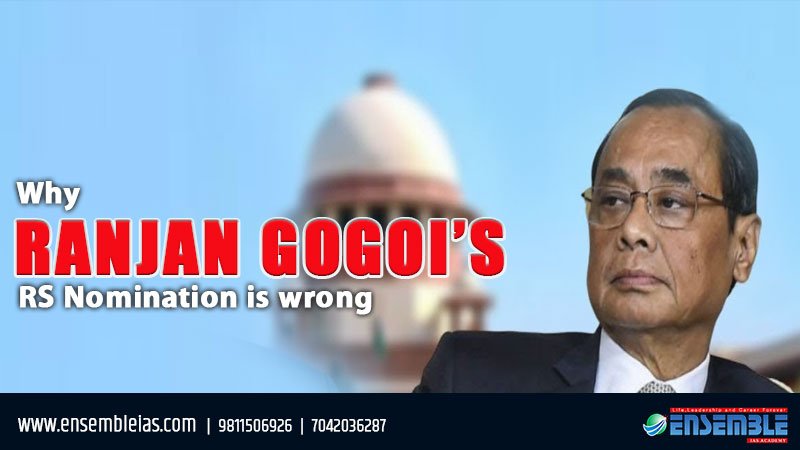Ranjan Gogoi It undermines the SC. The BJP should have paid heed to Arun Jaitley’s warning on post-retirement jobs for judges
This is not an article about Justice Ranjan Gogoi.
One of the brightest judges to preside over the Supreme Court (SC), (Ranjan Gogoi’s RS nomination) he may be the first to agree with the concerns that I am raising. This is about institutional erosion and the undermining of legacies built up over seven decades by responsible leaders, judges and governments.
Our system of governance works because it is based on the doctrine of separation of powers. So sacred is this divide between the judiciary and other state organs, that the SC has repeatedly reiterated that it forms part of the unalterable nature of our Constitution.
Our judiciary functions more on faith, trust, perception and belief than actuality and reality. Each of these pillars is shaken to the core by Justice Gogoi’s nomination to the Rajya Sabha. Irrespective of the merits of the person, such an appointment is bound to be perceived, (Ranjan Gogoi’s RS nomination) whether fairly or unfairly, as a question mark on the independence of the judiciary, of the institution that is the SC and of the last chief justice of India (CJI). It also lends weight to a perception that had been gaining ground that there is a clear weakening of the judiciary.
The only defence that the government can offer is the usual one of misleading whataboutery, viz that it has been done in the past. Each of those examples of is not in the least comparable to the present nomination. Justice Hidayatullah was appointed vice-president nine years after his tenure as CJI ended. Justice Ranganath Mishra was appointed six years after his retirement. Justice Bahraul Islam served as a member of the Rajya Sabha several years before he was elevated to the SC. Justice Subba Rao, who contested for the post of president (and lost to Zakir Hussain) was roundly criticised for the decision at that time.
What do the first two examples have in common? The time between their nomination to the Rajya Sabha and their retirement was substantial. There could be no call for any accusation or doubt.
The immediacy and hurried nature of the present appointment, barely four months after Justice Gogoi retired, is bound to give rise to questions about its context. It was a tenure that inspired much scrutiny; (Ranjan Gogoi’s RS nomination) a tenure which saw the repeated use of sealed envelopes, the contents of which were known only to the government; a tenure which recorded a significant and frequent number of judgments in favor of the executive. If people offer fair comment questioning the government’s motive, then it has only itself to blame.
The Bharatiya Janata Party (BJP) would do well to remember the caution expressed by one of its own. Arun Jaitley cautioned, in 2012, that “pre-retirement judgments are influenced by a desire for a post-retirement job”. Perhaps, those words were never more relevant than they are today.
There is another oft-quoted maxim in the law that judges, like Caesar’s wife, must be above suspicion. Can we truly say that no suspicion has been aroused by this appointment?
 Several appointments to administrative bodies require a cooling-off period for individuals so as to eliminate the possibility or suspicion of a conflict of interest or quid pro quo. Officials who retire from sensitive positions are barred from accepting any other appointment for a period of time, normally two years. These cooling-off periods in posts are premised on the snapping off of the nexus between previous incumbency and new appointment by the interposition of a sufficient time gap.
Several appointments to administrative bodies require a cooling-off period for individuals so as to eliminate the possibility or suspicion of a conflict of interest or quid pro quo. Officials who retire from sensitive positions are barred from accepting any other appointment for a period of time, normally two years. These cooling-off periods in posts are premised on the snapping off of the nexus between previous incumbency and new appointment by the interposition of a sufficient time gap.
In a recent article, I said that our courts are not in good health and increasingly there is a tendency to decide hard questions by adjourning or avoiding them. I added: “The Supreme Court in the past few years, in matters where there are great stakes involved, has shown a reluctance to act against the government. There has always been in courts a tendency to give the government a very long leash, but earlier, when it truly mattered, the Supreme Court had stepped in to check the government. Across a wide panoply of cases, that is not the case today…My fear is that the judiciary has lost some of its independence and the fearlessness that it needs to check the executive and the legislature.”
In all the precedents the BJP chooses to cite from the Congress’ term, this cooling-off period was more than satisfied. Jaitely had added, “For two years after retirement, there should be a gap (before appointment), because otherwise the government can directly or indirectly influence the courts and the dream to have an independent, impartial and fair judiciary in the country would never actualise”.
It seems the BJP does not share this concern for ensuring an independent, impartial and fair judiciary. It seems that rules, principles and morality and sermons vary depending on whether the BJP is in opposition or in power. This nomination is a great disservice to the legacy of the most vibrant and dynamic institutional pillar of the world’s largest democracy — the judiciary.
Source: Hindustan Times | Abhishek Singhvi
For more details : Ensemble IAS Academy Call Us : +91 98115 06926, +91 7042036287
Email: [email protected] Visit us:- https://ensembleias.com/
#Justice_Ranjan_Gogoi #india #prime_minister #narendra_modi #rajyasabha #Ranjan_gogoi #BJP #CJI #blog #current_affairs #daily_updates #free #editorial #geographyoptional #upsc2020 #ias #k_siddharthasir #ensembleiasacademy #Arun_Jaitley #Constitution
